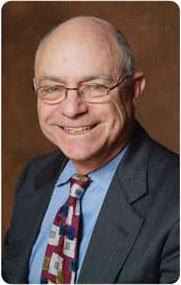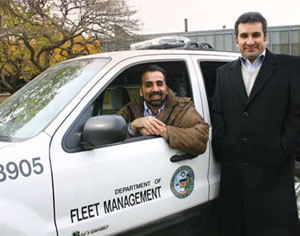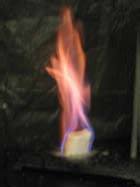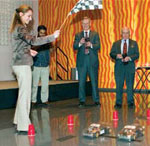“I believe the world is going to have to massively revise its energy supply and consumption patterns over the next several decades,” reflects Ralph L. Wanger, Illinois Institute of Technology trustee. “We are running into shortages of petroleum, which are going to fire a whole lot of new fuels. There are all sorts of environmental issues involved with the use of energy, including global warming and other problems of handling pollution. There is no way we are going to be able to continue to have growth in the United States or the rest of the world unless we can solve some of these energy problems.”
Respected Manager, Benefactor, and Visionary

How to go about solving some of the world’s energy problems is something that Ralph Wanger has considered seriously. With his observation that “nothing happens in science and engineering that doesn’t involve energy,” perhaps it should come as no surprise that Wanger has entrusted the task of discovering an energy solution to a university with strengths in both science and engineering. He has done so with a $5 million pledge to establish the IIT Wanger Institute for Sustainable Energy Research (WISER).
A graduate of Massachusetts Institute of Technology (MIT), Wanger chose IIT as the recipient of his benevolence because “a gift to IIT has more effect on the school than a gift to MIT would,” explains Wanger. “MIT is a larger, richer place at the top level of engineering schools. IIT is in the position for a lot more change and a lot more interesting projects. It will be a more effective gift.”
Wanger knows about anticipated yields on investments. For 33 years, he was manager of the Acorn Fund, one of the nation’s top-performing growth funds. He and his wife, Leah Zell, are principals of their management firm LZW Group, LLC. Wanger became an analyst in 1960 for Harris Associates, LP, eventually becoming a portfolio manager. In 1970, he established the enormously successful Acorn Fund, increasing its assets from $8 million to more than $13 billion during the years he managed the fund. During this time, Wanger left Harris to start Wanger Asset Management, LP before becoming an LZW principal in 2005. He has been featured in major newspaper and financial publications, and wrote the book A Zebra in Lion Country: Ralph Wanger’s Guide to Investment Survival, published in 1997.
The WISER gift is not the first that Wanger has made to bring a sense of excitement and renewal to IIT. In 2004, he and Leah donated $1 million to the Mies Society for renovation of the south porch of S. R. Crown Hall, home of the IIT College of Architecture.
“He’s an incredibly creative individual who has a sincere interest not only in helping IIT advance, but also in contributing to society by promoting initiatives that contribute to sustainability, especially in the energy area,” says IIT President John L. Anderson. “Ralph told me that he hopes WISER will give IIT opportunities to partner with other universities in both research and education. Our goal is to have WISER internationally recognized for both its research and educational programs.”
Ability to Do More
Officially launched on March 3, 2008, WISER will expand upon the work of the Energy and Sustainability Institute (ESI), created in 2004 through IIT Armour College of Engineering. “Ralph Wanger’s gift gives us great potential to go well beyond our initial aspirations for ESI,” says Anderson of ESI’s aim to develop state-of-the-art, interdisciplinary education and research programs, and to promote commercialization of some of the new ideas in areas related to energy and sustainability.
Hamid Arastoopour (M.S. GE ’75, Ph.D. ’78), Armour dean, newly appointed Linden Professor of Chemical and Biological Engineering, and recognized authority in particle technology and energy conversion systems, and Henry R. Linden (Ph.D. CHE ’52), Max McGraw Professor of Energy and Power Engineering and Management, were cofounders of ESI. Arastoopour acknowledges that Wanger’s gift will enable the university, through WISER, to build upon its existing strengths in energy and sustainability as well as to expand into new project areas. “Mr. Wanger’s gift is going to provide us with needed infrastructure, seed money for faculty research, and scholarships to attract top students,” says Arastoopour.

He says two elements set IIT apart from most other universities that have sustainability initiatives: a long track record of conducting energy research and a large and experienced faculty working together in an interdisciplinary environment. Arastoopour cites the example of architecture faculty collaborating with engineering faculty on wind and solar energy projects. In his analysis of initiatives at other universities with comparably sized sustainability programs to WISER, Arastoopour notes that each had received substantial funding from industry and government grants, which made a difference in what they could accomplish. Wanger’s gift will give IIT the competitive edge it was lacking.
Linden, director of IIT’s Energy + Power Center and architect of energy activities at IIT, says the gift will give the university the chance to do much more to address what he sees as “the critical issue of our times.” An IIT faculty member since 1954, Linden is a recognized authority in national and international energy economics and policy, and has spent his career researching, developing, and implementing sustainable global energy technology. “It has given us a real boost in going forward and a basis for raising other similar gifts to establish the institute,” says Linden of Wanger’s contribution. He is optimistic that the funding will make it easier to obtain the large corporate, state, and federal grants to help the institute attain its goal of establishing IIT as a national leader in energy and environmental and sustainability issues, complementing Chicago’s emergence as a forward-thinking city.
Building Upon IIT ’s Strengths

IIT took its first steps on the road to becoming an energy leader some 60 years ago, when it became affiliated with the Institute of Gas Technology (IGT) and began a graduate program in gas engineering and joint research endeavors. While IGT ended the graduate program in 1985, the Gas Research Institute, under Linden’s direction, provided IIT funding to hire faculty in the energy arena. Arastoopour was brought on to lead the new Energy Technology Program, resulting in the development of an energy specialization education program, expanded energy research, industry involvement, and the endowed chair that Linden occupies. In 2004, the ESI was established, providing opportunities for all of IIT’s colleges, schools, and centers to engage in energy and sustainability activities.
Under WISER, the university will build upon its strengths in four focus areas: energy production (clean coal technology); renewable energy (solar energy/hydrogen storage and fuel cells); energy efficiency, conservation, and sustainability (hybrid systems and sustainable buildings); and power and power distribution (security and the Galvin Electricity Initiative). Centered about these four areas of research, faculty from various disciplines within Armour College will continue to develop enterprising approaches toward a sustainable future.
Energy production

Linden defines sustainability as meaning “an inexhaustible, emission-free supply of energy.” A significant problem in coal burning—the major source of our nation’s electricity—is the generation of fossil fuel emissions, such as carbon dioxide, sulfur, nitrogen oxides, and mercury, which are responsible for adding to the planet’s greenhouse gas effect and polluting the environment. Arastoopour and Department of Chemical and Biological Engineering (ChBE) Distinguished Professor Dimitri Gidaspow (Ph.D. GT ’62) have developed mathematical models for a coal gasification process, the conversion of coal into gas. Their work, supported by the National Science Foundation (NSF), the Department of Energy (DOE), and industry, earned accolades from the American Institute of Chemical Engineering. ChBE GTI Associate Professor Javad Abbasian (M.S. GE ’78, Ph.D. ’86) is finding ways to remove carbon dioxide and sulfur from coal flue gas using high temperatures, and has successfully developed a novel sorbent, or sulfur-removing compound. Herek Clack, an associate professor in the Department of Mechanical, Materials, and Aerospace Engineering (MMAE), is investigating ways to remove mercury from the flue gas that results from the burning of coal.

Renewable energy
“Renewable energy, such as solar or wind, is not available continuously; therefore, we need to store produced electricity using high-capacity batteries or convert produced electrons to molecular form, such as hydrogen, then store it,” explains Arastoopour. ChBE Research Associate Professor Said Al-Hallaj (Ph.D. CHE ’00) is coordinating renewable energy initiatives for WISER through the Energy + Power Center. Several demonstration projects funded by the State of Illinois, the City of Chicago, and other entities are in progress, including a solarhydrogen hybrid fuel cell that powers an LED sign. One of Al-Hallaj’s newest projects is the development of a hybrid scooter that is powered by a battery, a fuel cell, and hydrogen gas. ChBE Distinguished Research Professor J. Robert Selman, in collaboration with Al-Hallaj, was awarded a patent in March 2007 for an electrostatic spray used in fuel cell technology. Research on the development of inexpensive and high-performance electrochemical fuel-cell systems is under the direction of ChBE Professor Jai Prakash, who is focusing his efforts on the integration of batteries, fuel cells, and capacitors in renewable power/energy systems.
Energy efficiency, conservation, and sustainability
Through his startup company, All Cell Technologies, LLC, Al-Hallaj is collaborating with Ali Emadi, a professor in the Department of Electrical and Computer Engineering and director of IIT’s Electric Power and Power Electronics Center, on the conversion of a City of Chicago hybrid SUV into a plug-in hybrid. With a battery that can be recharged by connecting a plug into an electric power source, a plug-in hybrid vehicle does not require any fossil fuel during its all-electric range if its battery is charged by a renewable energy source.
Emadi has led IIT research initiatives on the development of electric-hybrid vehicles and motor drive technology. Emadi’s two-pronged approach to hybrid systems consists of using already-built components in the conversion of traditional vehicles into hybrid vehicles and creating unique components for hybrid electric conversion kits. The kits are being developed in conjunction with Emadi’s startup company, Hybrid Electric Vehicle Technologies, Inc., and are expected to be ready for the market in 2009.
Imagine living in a house in the heart of the city that largely relies upon its own capabilities to supply heat and electricity while doing so in ways that contribute to a sustainable future. In 2005, ESI began plans for the creation of such a residence in the House of the Future initiative. Project leaders Arastoopour and Al-Hallaj are planning to incorporate such energy-efficient features as a solar roof, reversible metering, and a small wind turbine to help generate the building’s energy needs. This demonstration facility, to be erected on Main Campus, will serve as a sustainable showcase and science teaching laboratory for students in the local community as well as IIT students, several of whom drew up plans for the proposed design. In another project, IIT College of Architecture Professor Peter Land, an authority on tall buildings, and MMAE Associate Professor Dietmar Rempfer are collaborating on developing high-rises that effectively utilize wind turbines to produce the energy needs of buildings that have multiple housing units.
Power and power distribution
“Perfect Power” is a term that may sound impossible to accomplish, especially in regards to the electrical demands of a city. But in 2005, Motorola, Inc. founding family member, Bob Galvin, along with sons Chris and Mike, formed the Galvin Electricity Initiative in an attempt to achieve just that. Two of the power experts they approached to help create a prototype of the perfect power system were ECE Chair and Carl Bodine Professor Mohammad Shahidehpour and Associate Professor Alex Flueck, who, under WISER, will continue working on their design of a series of “intelligent” micro-grids powered by IIT and ComEd that would conform to the ways electricity is being used and adjust its flow rate accordingly. Such a system would result in less energy waste, ultimately reducing the need for fossil fuels.
Commitment to Sustainability
Impending shortages of natural resources, an ever-increasing world population, and the long-term effects of emissions produced in the manufacture of energy have made sustainability the catchword of the 2000s. With a history in energy research, an interdisciplinary team of thinkers and doers, and a vision to preserve the Earth's resources and environment for future generations, IIT is committed to taking on an increased leadership role in sustainability issues. "IIT Stuart School of Business introduced the sustainability concept into its graduate Environmental Management Program in 1999," says George P. Nassos, industry associate professor, adding that the following year, the Center for Sustainable Enterprise was established at Stuart. Nassos says that the center is a founding member of the Chicago Sustainable Business Alliance, an organization of nearly 160 members all striving for the advancement of sustainability.

Additional projects, such as the development of alternate sources of natural gas and the production of efficient and cost-effective biofuels, are underway at Armour and will continue to grow and perhaps even expand in new directions under WISER. “I envision the faculty from WISER will be consulted on energy policy and national research strategies,” says Anderson. “Our goal is to promote WISER beyond Chicago, especially in Washington, D.C., and internationally.” He adds that WISER should increase research and education opportunities for all students. “WISER represents a major theme of the university, embracing participation by all of our colleges,” he says.
Ralph Wanger sees the promise of a sustainable future in IIT’s students. “Sustainability is going to be one of the key long-term problems over the life of someone entering IIT as a student today. I believe the ability to have a program of this nature will attract highly qualified students and be good for the reputation of the school,” he explains. “I think everybody is enthusiastic and eager to make something that will be good for IIT, good for students, and good for America.”
A WISER CELEBRATION - MARCH 3, 2008

A radio-controlled electric car race that pitted WISER benefactor and trustee Ralph L. Wanger against IIT President John L. Anderson capped an informative, thought-provoking, and at times, just plain fun WISER launch celebration, held on March 3 on IIT’s Main Campus.
The academic colloquium portion of the event featured talks by IIT faculty as well as Charles Maxwell, energy analyst for Weeden & Co. Hans Maru (M.S. CHE ’70, Ph.D. ’75), retired chief technology officer and executive vice president of FuelCell Energy, Inc., delivered the plenary address, “Where Are the Fuel Cells?” Before introducing Maru, John W. Rowe, chair of the IIT Board of Trustees and utilities-industry leader for more than 24 years, briefly shared his view on new directions in energy. Rowe maintains that a successful transition from society’s carbon-incumbent lifestyle will involve a combination of energy-efficiency practices, the increased use of natural gas as a bridge fuel, and an increased acceptance of nuclear power in energy generation. “I continue to believe that the nation must come to terms with nuclear power,” said Rowe. “I can’t see how we have an energy future with electricity below 20 cents per kilowatt hour unless we have a significant goal for nuclear.”
Wanger’s sentiment, made at the event’s conclusion, served as a poignant summary of why sustainability should matter. “I’m very worried about my granddaughter, Katherine, who is here,” he said. “I’d like to make sure that she grows up in a healthy, safe, and prosperous world. This is my gift to Katherine to help make her a happy and productive adult.”